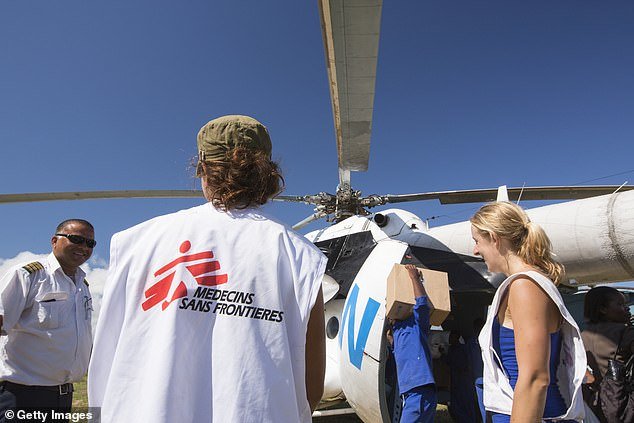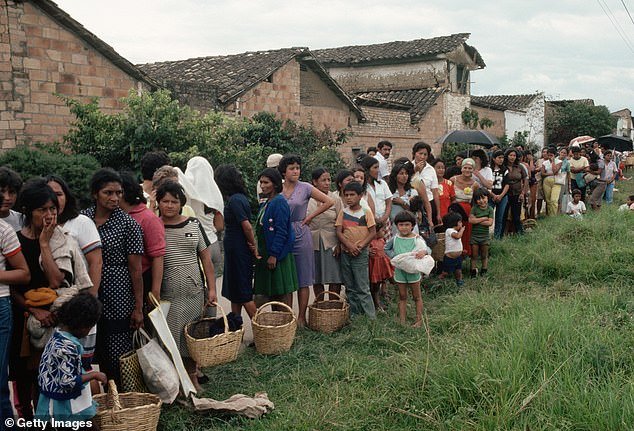Britain's Foreign, Commonwealth and Development Office has banned sexual relationships between staff and those receiving aid, based on 'inherently unequal power dynamics
A sex ban has been imposed on Britain's overseas aid workers as the Government warns staff in relationships with a disaster zone victims face 'gross misconduct' proceedings.
Britain's Foreign, Commonwealth and Development Office (FCDO) has banned sexual relationships between staff and those receiving aid, based on 'inherently unequal power dynamics that can lead to increased vulnerability to sexual exploitation and abuse and sexual harassment if power is abused'.

It has also banned 'sexual activity with children regardless of the age of consent locally, exchange of money, employment, goods, or services for sex.'
The official guidance up until now said that sex with beneficiaries of humanitarian aid was only 'strongly discouraged'.
The proposed change would only apply to those employed by the UK Government and not charity workers on Government contracts or employed by the private sector.
Nigel Adams, Minister of State for Asia said in a letter to the International Development Select Committee: 'Safeguarding against sexual exploitation and abuse and sexual harassment remains a top priority for the FCDO and we will not hesitate to take swift action if any staff member or any organisation we work with fails to uphold our strict standards.'
Sarah Champion, chair of the International Development Select Committee, told the Telegraph : 'Whilst I am pleased the Government have now agreed to make sexual relations with beneficiaries a sackable offence, it should have been in place from the start, not an afterthought when they are forced into adding it.

'Aid beneficiaries are by their very nature the most vulnerable people on the planet.
'To say I was shocked when our inquiry found out Government staff were only discouraged, rather than banned, would be an understatement – I was appalled.'
An investigation by The Thomson Reuters Foundation and The New Humanitarian found that more than 50 women accused aid workers from World Health Organization, the U.N. migration agency (IOM), the U.N. children's agency (UNICEF), Oxfam, World Vision, Medecins Sans Frontieres and ALIMA demanding sex for jobs during the 2018-2020 Ebola outbreak.
It follows a 142-page report published last year by The Charity Commission for England and Wales that said there was a 'culture of poor behaviour' among Oxfam staff sent to help victims of the 2010 Haiti earthquake.
After an 18-month investigation found serious allegations of wrongdoing including sexual abuse of children were not fully disclosed.
The commission said Oxfam failed to adequately investigate allegations that children as young as 12 or 13 were victims of sexual misconduct against a charity 'boss'.
Oxfam was plunged into crisis in February 2018 when it emerged that some of its workers engaged in 'sex parties' with prostitutes after the humanitarian disaster in the Caribbean country.
The commission launched its inquiry amid concerns Oxfam may not have fully and frankly disclosed material details about the allegations at the time in 2011, its handling of the incidents since, and the impact these have had on public trust and confidence.
Caroline Thomson, chair of trustees at Oxfam GB, said at the time: 'What happened in Haiti was shameful and we are deeply sorry. It was a terrible abuse of power, and an affront to the values that Oxfam holds dear.'
'The commission's findings are very uncomfortable for Oxfam GB but we accept them.
'We now know that the 2011 investigation and reporting of what happened in Haiti was flawed; more should have been done to establish whether minors were involved.
'The decision to allow the Country Director to resign without a fuller investigation of his own conduct would not be permitted today, under our current policies and practices.
'And while the commission makes clear that it found no record of a 'cover-up,' we accept that Oxfam GB should have been fuller and franker in its initial reporting of the allegations.'















